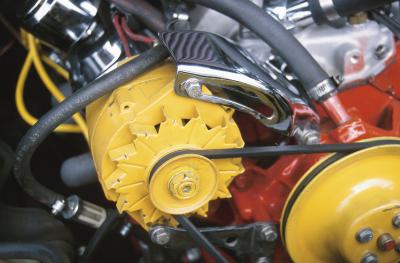
The alternator is the power generation system in your engine. When the alternator is running properly, it charges the battery as long as the car is running. If the alternator does not work or is improperly providing power to the battery, the car will only be able to run for a few minutes on battery power alone. If you have a noisy alternator, you can begin to diagnose the problem yourself by selectively eliminating a series of issues one at a time until you find the problem.
Check the drive pulley for rattling by holding it with your hand and testing it by shaking it back and forth. There should be very little play. If the pulley is loose, tighten the pulley by using a wrench on the pulley nut in the center.
The alternator is held in place by a series of mounting bolts. Occasionally they become loose over time, causing the alternator to rattle. Check the bolts and tighten as necessary.
If the bearings in your alternator are worn or dirty, the drive-shaft of the alternator will have a hard time spinning freely, causing heat to build up and extra strain on the alternator. If the alternator does not spin freely, the bearing may be worn and the entire unit may need to be repaired or replaced by a professional.
The stator inside the alternator is a series of electro-magnets that creates the AC current to charge the battery. If the stator is bad, it may no longer be providing sufficient power to charge the battery. You will need to test for open circuits and for a proper ground connection in the stator